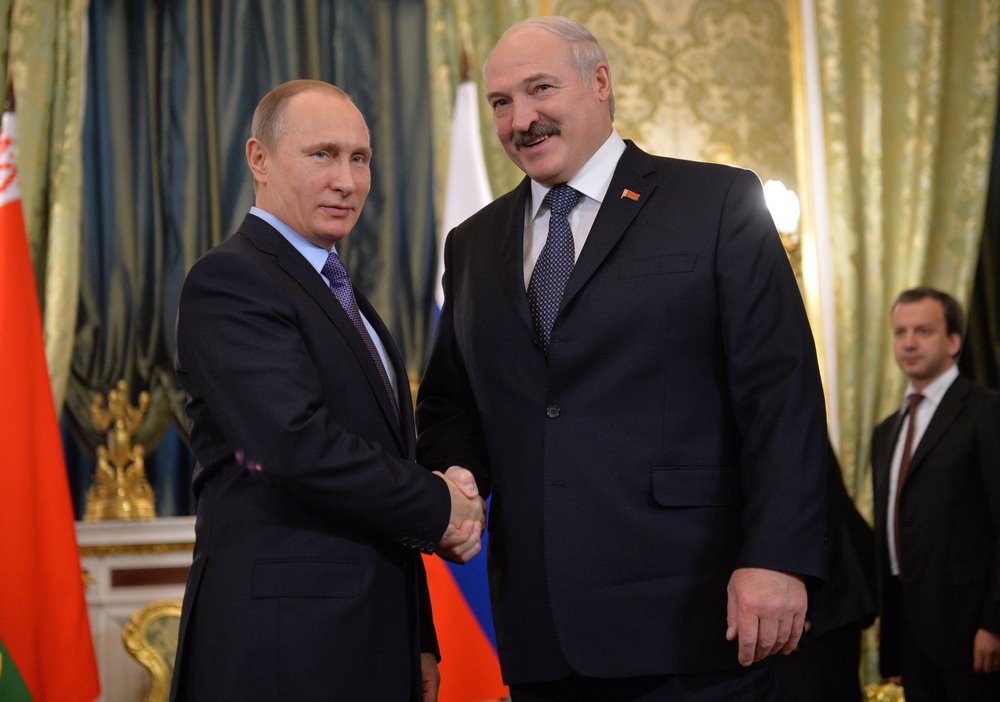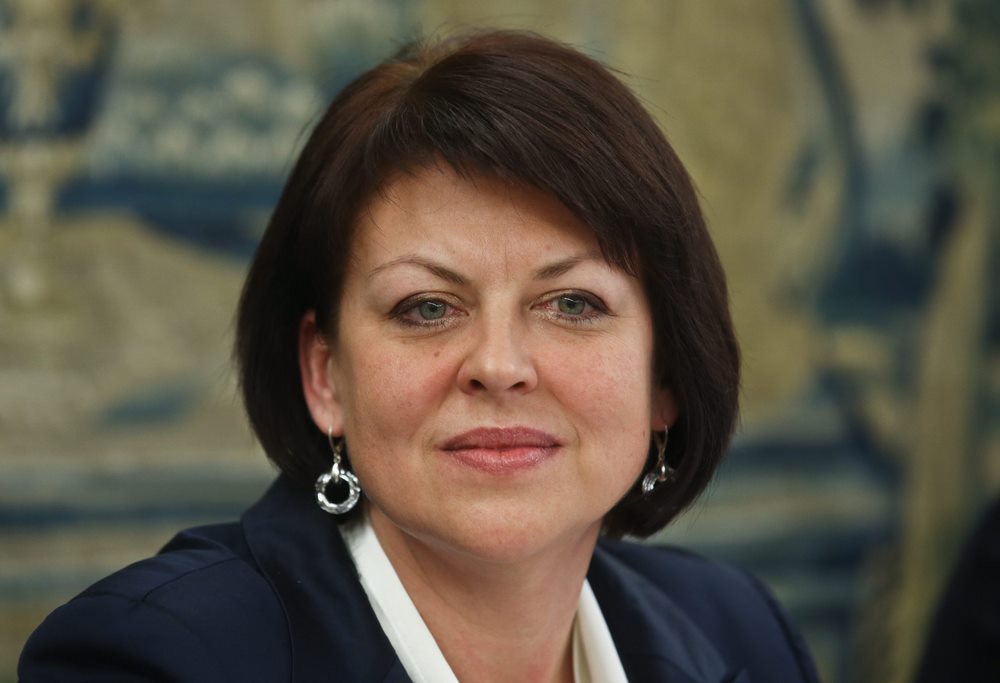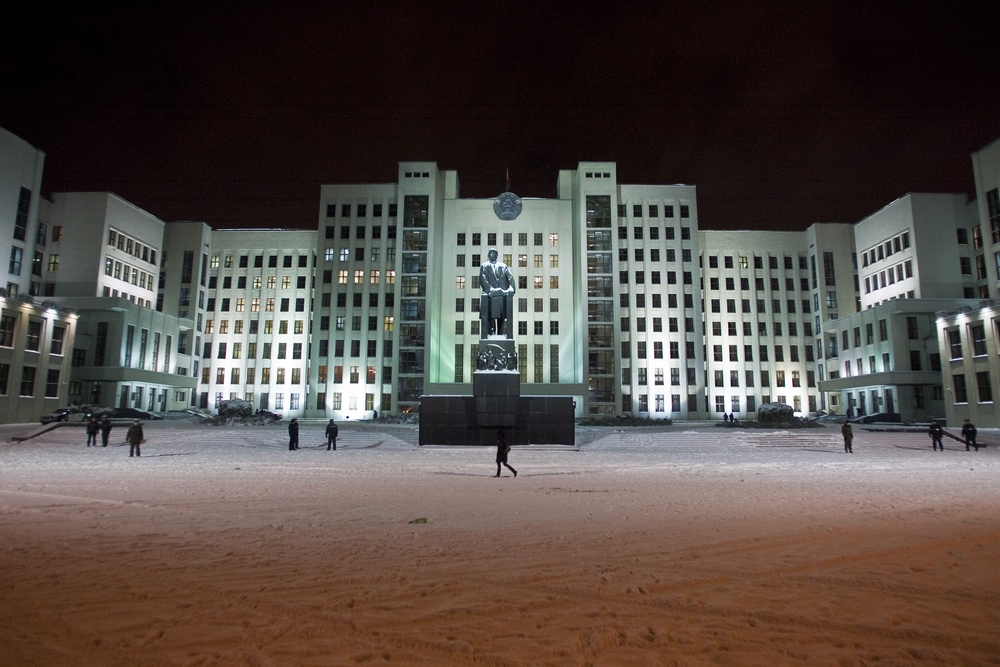THE WARSAW INSTITUTE REVIEW
Date: 1 June 2018 Author: Piotr Kościński
Lukashenko is Playing Several Pianos
The Belarusian authorities have declared their willingness for rapprochement with the European Union and the West in general, which is worrying Russia. President Alexander Lukashenko and his colleagues have already made similar declarations, later changing course and turning back to Moscow again. Whether this is a serious entreaty or just another political maneuver, remains to be seen.

The internal situation in Belarus remains unchanged, and the expected liberalization, minimal at best. “From an economic point of view, we are heavily dependent on Russia. That is why we have the task of diversifying our relations, first of all economically. We would like to have closer relations with the European Union. This is our goal and we are actively working on it” — said the Minister of Foreign Affairs of Belarus Vladimir Makei in spring 2018. He emphasized that “Belarus is not a part of Russia” and that “Minsk has an independent foreign policy.”[1] The Russian website Lenta.ru declared this is how Belarusian authorities are suggesting to Moscow that they will not be on Russia’s side in a conflict with the West. The article titled “Baćka No Longer a Dictator”, drew attention to the fact that when Western countries expelled Russian diplomats, showing solidarity with Great Britain, the Belarusian minister was just beginning his visit to London. “The official comments of the Foreign Ministry of Belarus in this matter looked clearly neutrally.”[2]
According to Lenta, the change in Minsk’s position could already be felt in 2008, during the Russo-Georgian War. Although Alexander Lukashenko praised Russia for “peaceful, wise and beautiful” behavior, he left the decision to recognize South Ossetia and Abkhazia to the parliament which did nothing. And then the Belarusian president officially stated that recognition of the independence of the self-proclaimed republics would simply not happen. Later, as a matter of fact, there was the presidential election in December 2010, the brutal break-up of an anti-Lukashenko demonstration and Western sanctions. However, the events in Ukraine changed things. Belarus did not recognize the annexation of Crimea and did not support Russian aggression.
Speaking recently, Alexander Lukashenko addressed a statement to the leaders of the European Union. “I just want them to respect us and to be aware that there is such a state in the center of Europe like Belarus.” And he pointed out that although in the Belarusian leadership there were “national differences” in the understanding of democracy, “the essence of its foreign policy is multi-vector.”[3]
The Train to Grodno
A train runs from Grodno, located 25 kilometers from the Polish border, to Poland on European tracks. Until recently, traders were the main passengers, stuffing cigarettes and vodka bottles wherever they could. And it is hardly surprising, cigarettes and vodka have always been undoubtedly cheaper there. Today, most passengers hand over documents to the border guards proving they are allowed to work in Poland and do not think about smuggling at all. On the other hand, Poles traveling to Grodno are surprised by the meticulous customs control that Belarusians are subject to at the station (Poles are usually allowed to pass without being checked). They stop being surprised when they look into the shops — Belarus has become expensive. Besides alcohol and cigarettes, almost everything is more expensive there than in Poland, even though the citizens of Belarus earn less than Poles. The average monthly salary is €640 (nearly half that of Poland).
“The information that I am getting indicates that people do not feel an improvement to the situation right now. Half of the inhabitants of our country believe that in 2017, the socio-economic situation continued to deteriorate, about 40 percent did not see any changes”, said Lukashenko in March 2018 at a meeting with members of the government.[4] As he emphasized, over the last seven years, Belarusian GDP has grown less than 6%, so very little. “If our growth is slower than others, it means that we are lagging behind”, he stressed. “We are lagging behind in the field of development, technology and, of course, in terms of living standards. But as president, this is not the only thing that concerns me. You cannot ignore those processes inside the country that have already become persistent. I am talking about interregional stratification”, emphasized Lukashenko.
And indeed, the Minsk region is developing fastest, followed by Grodno; other places are stagnating, and in Mogilev the economic situation has even worsened. There are at least several reasons. Paradoxically, problems are traditionally created by Lukashenko’s closest ally — Russia. Another “milk war” is under way. In 2017, Rosselkhoznadzor, an institution controlling food quality and expertly used for political purposes, limited the access of Belarusian food products to the Russian market. In December, it prohibited the importation of products from 54 Belarusian dairies. The Russians are increasingly finding supposedly dangerous ingredients in Belarusian milk. “We will not tolerate this. The intelligence services informed me that Russia imported powdered milk from New Zealand”, said the irritated Belarusian president.[5]
Moscow’s actions result are tied to the persistent attempts to combat “Belarusian shrimp”, that is, goods from the West on which Russian sanctions were imposed, which in Belarus obtain the appropriate stamp and pretend that they were caught in the “Belarusian sea”. If you cannot stop shrimp, you can limit milk purchases. But the “milk war” has more complex causes — this is a form of pressure on Minsk to agree to Moscow’s demands in completely different spheres than the economy. “It is becoming funny. The media publishes jokes about our union [Eurasian Economic Union, EAEU, in which member states act more severely toward each other than with external partners. I am not talking about milk, which has recently become a political instrument. We cannot even easily sell cement”, Lukashenko complained during the aforementioned meeting. And he stressed that the management of EAEU only “pretended to act”, failing to respond to real problems.[6] Looking more broadly, the main and insoluble problem of Belarus is that it has largely preserved the former post-Soviet economy, reforming themselves to a relatively small extent. This limits its growth and makes Belarus dependant upon external support, above all from Russia. This makes reform even more difficult.
Minsk’s Weakening Position
There has been much talk about Lukashenko and Belarus in the world in connection with the meetings in Minsk, aimed at mediating the conflict in Donbass. Then, quite unexpectedly, the Belarusian capital became a very important place. It was a rare occurrence that Minsk would simultaneously host the presidents of Russia, Ukraine, France and the German Chancellor — as in February 2015. Especially since, following the brutal crackdown against the opposition in 2010, relations between Belarus and the West cooled dramatically. Now in Minsk, experts rarely talk, although the deputy head of the Russian Ministry of Foreign Affairs, Grigory Karasin, recently said that the next four-party meeting (though it is not clear at what level) could come soon.[7] The case of Donbass has been overshadowed by the attempt to murder the Russian ex-spy Sergei Skripal in London, which caused a growing conflict between the West and Russia. “Belarusian peacekeepers are ready to stand between the parties to the conflict in Ukraine, if only Poroshenko and Putin could reach an agreement”, Lukashenko recently announced.[8] And he added that he does not intend to be “anyone’s person”, but only to fulfill an agreement. “If you want me to deploy 10,000 Belarusian soldiers, I will put them on the border wherever you like,” he added.
But perhaps the time when Lukashenko played a role in the international arena, trying to mediate between Ukraine and Russia and hosting European politicians, has definitely passed. Now the head of the Belarusian state is trying to prevent a growing conflict with Russia, an element of which is the “milk war”. According to the independent Belarusian political scientist Uladzimir Padhol, for several years Russia has been increasing pressure on Minsk. Lukashenko himself said in 2014: “We are being threatened that, tomorrow, Putin will come here and take us over. If they come, we will fight. It is not known yet, on whose side the Russian soldiers will be if they come to Belarus. And I know on which side. So do not threaten us.”
Also last year, an expert from the Minsk Center for Strategic Research and International Politics, Jurij Carik, argued that only Russia was interested in the destabilization of Belarus. Commenting on a report from the Center (he wrote about the possible triggering of a serious conflict in the state), Carik pointed out that “the leadership of the Russian Federation is interested in transforming Belarus into its military-political bridgehead”. Goal: to create a threat to NATO, so that it will be forced at great expense and effort to strengthen its eastern flank. Lukashenko may be an obstacle to this. If so, the Russians may want to weaken him, and the simplest way is to create internal unrest.[9] Lukashenko understands this perfectly. As he said recently, Belarus is “an island of stability. If vigilance is weakened for even a minute — they will rip off our heads and we will not even feel it.” Hence the insistence that President Vladimir Putin, fresh off of his election victory, meet him in Minsk. Official reports indicate that such a meeting will take place, although it is not known when. If you read these reports carefully, before the Russian elections it was pointed out that the meeting was to concern in particular “cooperation in the sphere of war and politics”. Lukashenko wants to obtain planes and Iskander missiles from Russia, and Putin wants to get permission to establish an airbase in Belarus and for uninhibited military flights over the country. But the Belarussian president does not want to agree to this, and after the election the “military-political” subject disappeared from the news.

0.02 Percent Opposition
Relatively little has changed in internal affairs. The local elections that took place on March 23 this year may have been a surprise to some who were expecting greater (or at least some) democratization of the country. Of the 18,000 newly elected deputies at all levels, only two are representatives of the opposition, or 0.02 percent overall. They are Roza Strielchenko, an independent elected to the rural council in the Homel region and Valerij Bilibuch from the unregistered Belarusian Christian Democracy party in the Brest region. Besides, only a small number of political party representatives were elected — only 2.5% countrywide for all councilors, which clearly shows that the authorities do not want the existence of strong political groups. Pro-Lukashenko communists won a total of 309 seats, doing especially well in Minsk — they have as much as ten percent of the deputies there; another “licensed opposition” in the form of the Liberal Democratic Party of Belarus has only five councilors throughout the entire country.
It is worth noting, however, that only 22,000 candidates campaigned for the aforementioned 18,000 positions, so there was more than one candidate in only about one-fifth of all election districts. Again, we were dealing with “choices without an alternative”, where voters could only vote “for” or “against”. In reality, they only had one option, because others are very unwelcome: to support the only, right candidate, as in the times of the USSR. “In local elections, the authorities put the finishing touches on options for the parliamentary and presidential elections in the local elections. They tested the effectiveness of falsification schemes and people were checked, ready to carry out violations of electoral law”, Uladzimir Padhol told the Do Rzeczy weekly. “The number of oppositionists who made it onto councils did not have any meaning in this context”, he added.[10]
Hopes for some positive change seem to be in vain. Several years ago, all political prisoners were released, which allowed for some warming in relations with the West. Today, there are new prisoners, but for some reason the West is quiet. Also the opposition is weak and therefore not very active. It mobilized in March on the occasion of the 100th anniversary of the establishment of the Belarusian People’s Republic (BRL), which existed briefly and was only recognized by Finland (and in practice by the Baltic States). President Lukashenko, for whom only the Soviet tradition is important, did not say much about the BRL. “On one hand, the creators of the BRL wanted independence, on the other they were ready to ask for help from anyone, and then they would be under someone else’s boot again”, he emphasized recently.
Problems of Poles in Belarus
A sad example of the behavior of the Belarusian authorities is the situation of the Poles there. According to official data, there are 295,000 ethnic Poles; unofficially there is talk of as many as one million. In 2005, the Belarusian authorities did not recognize the results of the congress of the Union of Poles in Belarus (ZPB), because they did not like the new leadership with Andżelika Borys at the forefront. As a result, there are two organizations.
The Union of Poles in Belarus, recognized by Warsaw, although illegitimate, is tolerated by the authorities. It organizes various activities and meetings in Grodno and beyond. There is also the “Lukashenko” ZPB, which does exist, but does not even pretend to be active; in the Polish Homes purchased with Polish money in over a dozen cities in Belarus, in former classrooms where Polish was taught, commercial companies are now operating. The Polish group in the kindergarten in Grodno, abruptly done away with in 2015 in the middle of the school year, is not allowed to reconstitute itself.
The Association of Poles in Belarus, which is not recognized by the authorities, began collecting signatures to a petition to create a third Polish-language first grade at the Polish school (there are two). The Grodno authorities have not allowed this for another consecutive year, and some children, even taking part in preparatory courses, are not admitted to this school. The Association of Poles in Belarus wants this to change this year.[11]

There has now appeared, or rather returned, another serious problem. It turned out that the government of Belarus approved changes in the education law, which will make some of the subjects in minority (Polish and Lithuanian) schools to be taught in the state language. And this doubtlessly means in Russian, because the Belarusian language is still in second place behind Russian in schools. On a national scale, 130,000 students are taught in Belarusian out of every million.[12]
Meanwhile, Polish-Belarusian relations are so limited that possible interventions of Polish authorities will not gain much. Whereas, the government of Belarus does not concern itself with the activities of the unrecognized wing of the Union of Poles, and the legal faction does nothing. Generally, so far, both Poland and other Western countries were not capable of speaking with Alexander Lukashenko. Just as there were no ideas for Belarus and for Lukashenko, there still are none. Which he knows perfectly well, playing on several pianos at once with difficulty, so as not to lose power — and not lose Belarus.
[1] Ruslan Szoszyn ‘Białorusini mówią o dywersyfikacji, Rosjanie niezadowoleni’, Rzeczpospolita, 21 April 2018; available at http://www.rp.pl/Dyplomacja/180419287-Bialorusini-mowia-o-dywersyfikacji-Rosjanie-niezadowoleni.html [Retrieved May 12, 2018].
[2] Bat’ka bolsze nie dyktator, Lenta.ru, 14 April 2018, https://lenta.ru/articles/2018/04/14/razvernulo/ [Retrieved: May 12, 2018].
[3] Artiomenko, Siergiej, Otmyt’ dobieła. Łukaszenko wstajet z kolion pslie wizita Makieja w Łondon, Regnum, May 1, 2018; available at: https://regnum.ru/news/2398580.html [Retrieved: May 12, 2018].
[4] Łukaszenko potriebował ustojcziwogo rosta i upreknuł prawitielstwo w zamusoliwanii problem, Tut.by, March 2, 2018, https://news.tut.by/economics/583389.html?crnd=65438 [Retrieved May, 12 2018].
[5] Łukaszenko prigroził otwietit’ Rossii na zapriet mołoka, Lenta.ru, March 1, 2018, https://lenta.ru/news/2018/03/01/lukaenraged/ [Retrieved May 12, 2018].
[6] Łukaszenko prigroził otwietit’ Rossii na zapriet mołoka.
[7] Stanisław Chamdochow. ‘Karasin: wopros strieczi gław MID „normanskoj czetwiorki” obsużdajetsja’. Rossijskaja Gazieta, May 12, 2018, https://rg.ru/2018/05/10/karasin-vopros-vstrechi-glav-mid-normandskoj-chetverki-obsuzhdaetsia.html [Retrieved May 12, 2018].
[8] Łukaszenko: Naszi mirotworcy wstanut mieżdu storonami konflikta w Ukrainie pri sogłasii Poroszenko i Putina, Tut.by, February 18, 2018, https://news.tut.by/economics/581647.html [Retrieved May 12, 2018].
[9] Aleksandr Bankowicz. ‘Jurij Carik: Rossija jedinstwiennaja zaintieresowana w destabilizacji Biełarusi’, Naviny.by, March 29, 2017, https://naviny.by/article/20170329/1490784362-yuriy-carik-rossiya-edinstvennaya-zainteresovana-v-destabilizacii [Retrieved: May 12, 2018].
[10] Uładzimir Podgoł — statement noted by the author, April 2018.
[11] Wraca groźba rusyfikacji polskich szkół. Andżelika Borys: Związek Polaków na Białorusi zapowiada protesty, jeśli nic się nie zmieni, PolskieRadio.pl, April 13, 2018., https://www.polskieradio.pl/75/921/Artykul/2101007,Wraca-grozba-rusyfikacji-polskich-szkol-Andzelika-Borys-Zwiazek-Polakow-na-Bialorusi-zapowiada-protesty-jesli-nic-sie-nie-zmieni [Retrieved May 12, 2018].
[12] Nastassija Rouda, Zachouwajcie: spis szkoł Minska i bujnych haradou Biełarusi, dze wuchac’ pa-biełausku, Tut.by, July 13, 2017, https://news.tut.by/society/547152.html [Retrieved May 12, 2018]
All texts published by the Warsaw Institute Foundation may be disseminated on the condition that their origin is credited. Images may not be used without permission.












